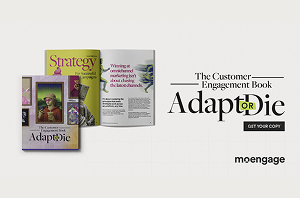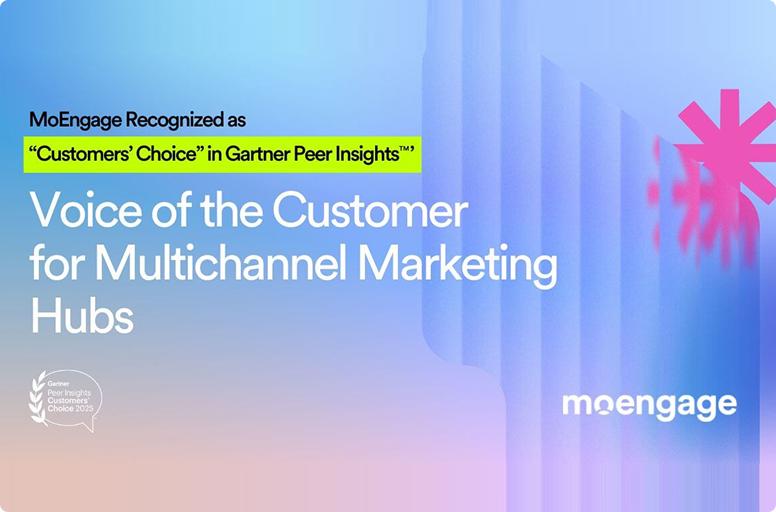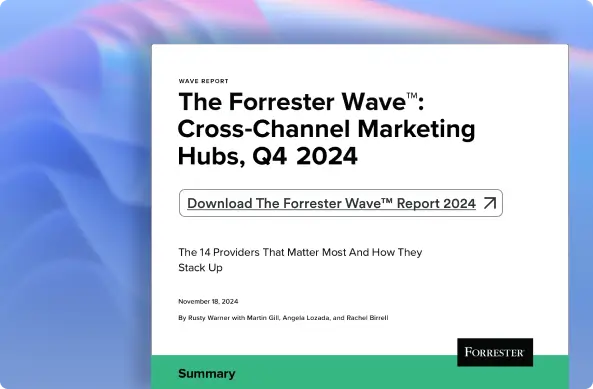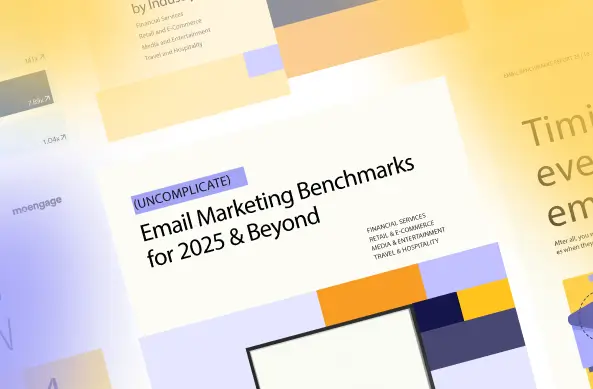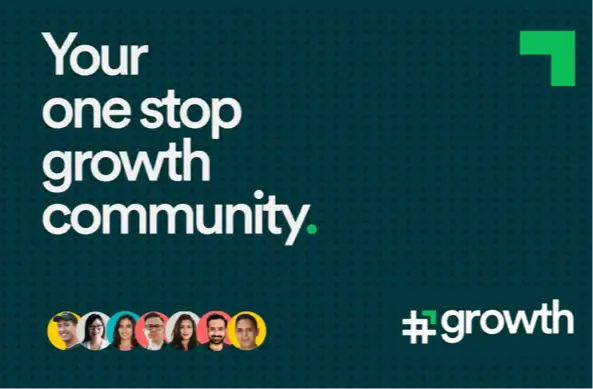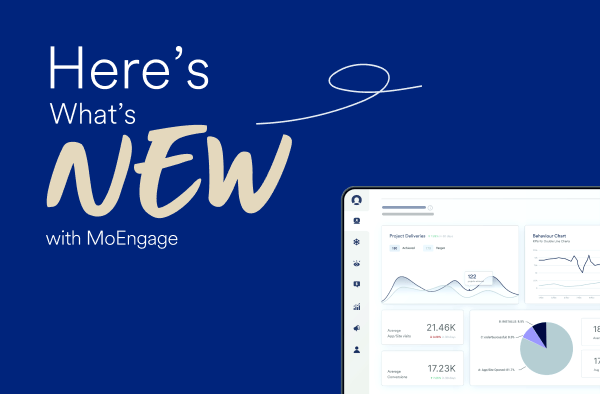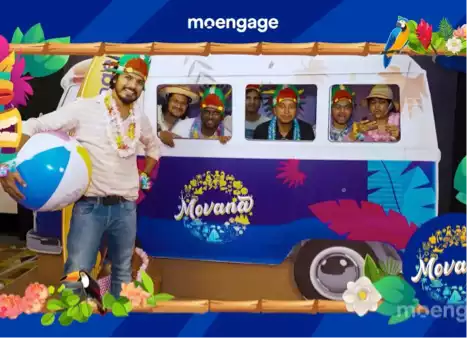Messenger vs. WhatsApp: 6 Differences Marketers Should Know
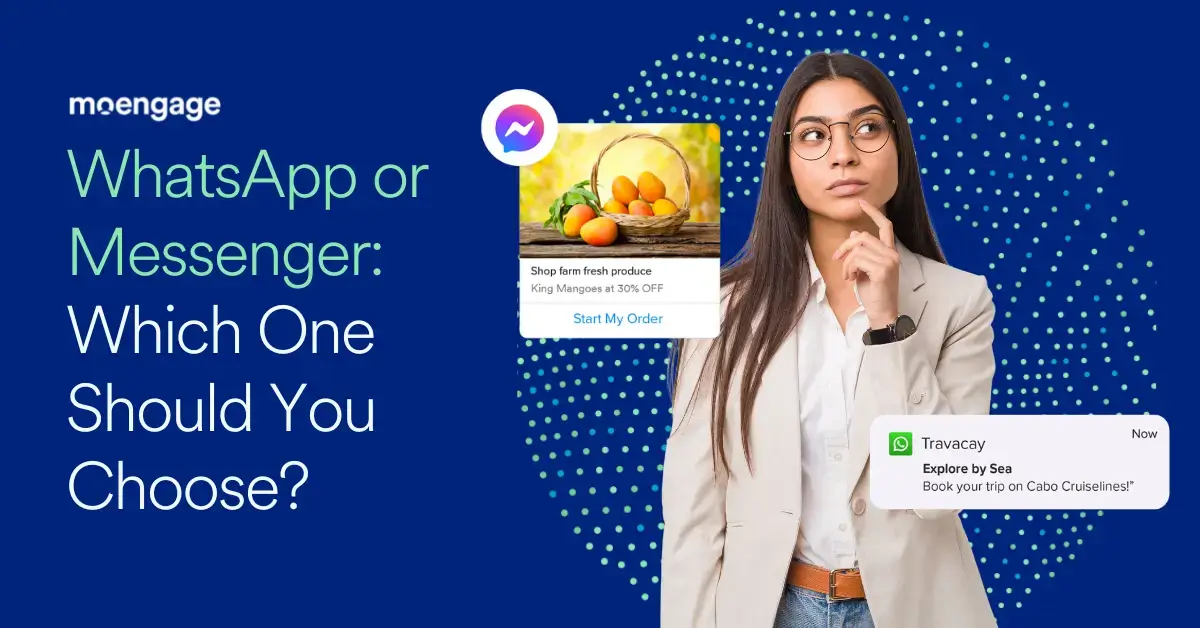
Reading Time: 7 minutes
There’s no denying that online instant messaging is gaining a measurable edge over traditional messaging services. In a world of texting vs. social media, the emergence of messaging apps has set the pace for social media growth.
As if that wasn’t enough, messaging apps have become the go-to communication tool, with WhatsApp and Messenger being the most popular. Case in point—Facebook owns WhatsApp, with over two billion active users, and in some markets, the two apps combined hold over 90% market share.
Here’s where things get more interesting: those using WhatsApp and Messenger to connect with family and friends also want to conduct business through these familiar platforms, desiring an experience that’s just as fast. Simple and seamless.
There’s a constant debate about the best platform for marketing among the two messaging giants in the marketing industry. This post will highlight the key differences between WhatsApp and Messenger apps in the context of marketing. Then, we’ll discuss which one would make more sense to achieve your marketing goals.
Bonus Content:
- 🔍 Download Ebook here to understand how to use WhatsApp Business for marketing and conversational commerce.
- Did you know that personalized WhatsApp campaigns can drive up to 3X the ROI? Check out your potential ROI using our WhatsApp ROI Calculator.
WhatsApp in the Context of Marketing
WhatsApp is a free mobile messaging application that connects people around the world. It allows users to chat, make voice and video calls, and share images, documents, user locations, and other media.
In marketing, WhatsApp is an excellent channel of communication that allows you to engage directly with customers online, just like in physical stores. As the most popular global messenger app with approximately two billion monthly active users, it taps into consumer preference for a digital-first, always-on experience.
Using WhatsApp for marketing makes communication easily accessible and personalizes your approach to customer care. Depending on your niche, it can boost your reply rate, get new customers, and even increase your sales.
Take Nissan Saudi Arabia, for instance.
The company created an automated chatbot powered by WhatsApp to provide quick support to its customers, giving them prompt automated answers without agent involvement.
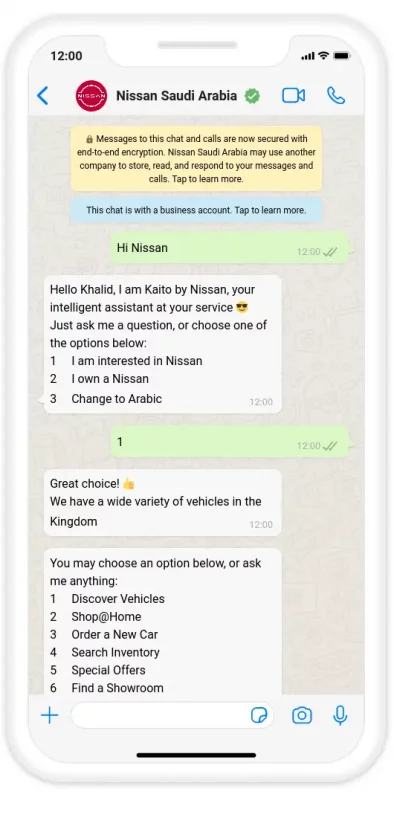
The end result? Nissan Saudi Arabia saw a 390% increase in leads and a 33% reduction in inbound calls.
Facebook Messenger in the Context of Marketing
Messenger is a mobile messaging platform developed by Facebook that allows customers to send messages, and exchange files, audio, videos, and stickers. It also enables customers’ interactions with a chatbot and supports voice and video calling.
For marketing, Messenger provides a convenient and fast way for businesses to connect with customers globally. With an enormous audience using the platform each month, brands can send marketing messages in any form, including videos, texts, and chatbots.
Nike launched the Jordan Facebook Messenger, which helped the company get an impressive 87% open rate.
Here’s how the campaign worked: whenever a customer opens Jordan’s Facebook page, the chat window would open automatically, allowing them to interact with the brand and learn more about the world’s most famous sneakers.
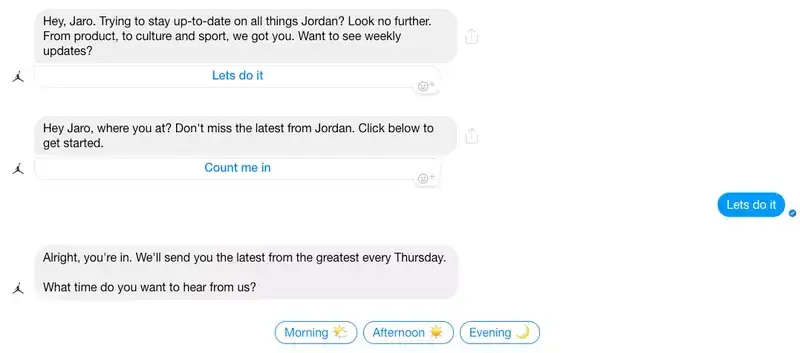
Messenger marketing also allows businesses to communicate with their customers via live chat. In return, consumers see what brands sell and purchase the products or services offered.
Difference between WhatsApp and Messenger for Marketing
The main difference between marketing for WhatsApp and Messenger is the ecosystem they are developed in. WhatsApp is more element-rich in features than Messenger, allowing you to apply different strategies to market your business.
Below is a more detailed comparison of each platform’s advertising components.
1. Customer Relationship
WhatsApp provides a wide range of opportunities for high engagement with customers. About 58% of users check their WhatsApp more than a few times a day. This means you can regularly engage with your customers and build a rapport for easy promotion of your business.
With WhatsApp, you can use inbound channels to send special offers, personalized messages, birthday congratulations, and so on. Be confident that most of your customers will read your messages upon receiving them.
WhatsApp also has a group chat feature where you can create a group of 256 people interested in your brand. With this feature, you can send early-bird promo codes and exclusive offers and keep the group members abreast of the latest news concerning your brand.
Another vital feature is the WhatsApp broadcast, which lets you send text and video announcements to multiple people simultaneously.
Unlike WhatsApp, a standalone app, Facebook Messenger requires Facebook login details to get on the app. Facebook Messenger uses chatbots as one of its marketing tools to generate leads and traffic. It also assists with customer service. For instance, the Facebook Messenger chatbot can be set up to take orders or complete purchases without customers having to leave the app.
Here are just some of the things the chatbot can do:
-
-
- Increase lead generation through a Facebook page
- Automate responses to customer queries that come through the platform
- Get contact details
- Answer basic questions
-
2. Advert Campaigns
There are several WhatsApp marketing campaign ideas to drive customers to your business. You can sync your WhatsApp Business account to a Facebook business account and direct users to your WhatsApp directly from Facebook or Instagram.
You can check out the best time to post on Instagram or Facebook, then create an ad or boost a post. When a user clicks the CTA message on the ad, they are transferred to a WhatsApp chat where they can send a message to you easily and quickly.
Another marketing campaign idea for WhatsApp is showcasing your products in a catalog. Think of your WhatsApp Business catalog tool as a mobile storefront where customers can browse and shop the products on display without leaving the app.
With WhatsApp’s catalog, you can:
-
-
- Highlight up to 500 products
- Sort them into collections for easy browsing
- Include title, price, description, and product code
- Link the product to your website
- Add links from the catalog in WhatsApp conversations
-
Advert campaigns for Facebook Messenger are a little different from WhatsApp. Messenger ads are targeted like regular Facebook ads. The ad can link to a landing page or connect to a chatbot to promote interaction with the brand.
Let’s not forget the highly convenient auto-reply feature. You can create a Facebook Business page and set up Facebook Messenger to auto-reply to any message a prospect sends you through the Facebook page, even when you’re not online.
With Facebook Messenger, you can:
-
-
- Advertise a promotion
- Collect customer data
- Retarget a specific subset of customers
-
3. Multiple Media Formats
WhatsApp has multiple communication features like videos, statuses, chats, photos, and voice messages that let you send different media types to customers. Share marketing materials such as brochures, advert posters, and website links, enabling customers to get more information about your products and services.
For instance, WhatsApp has an in-built pop-up YouTube viewer that allows customers to view your YouTube marketing video directly on the app.
It also offers a 24-hour status feature similar to Facebook and Instagram stories. Here, you can share promotional and informative content like links and multimedia files with all your contacts in exchange for their feedback.
Like WhatsApp, Messenger also has intriguing features that facilitate the sharing of multimedia files with a single tap. It also has a feature allowing attendees to participate in events through the app.
The only difference is that WhatsApp is more feature-rich and can share contacts, media files, and documents without login requirements.
4. Access to a Broad Audience
With over two billion active users worldwide, you can access an enormous audience on WhatsApp, even more than Messenger.
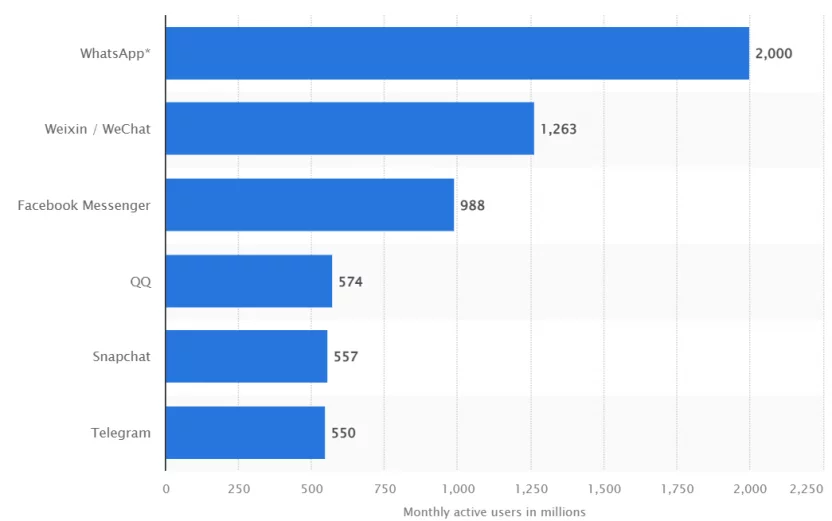
WhatsApp is very present in people’s everyday lives. That means advertising on WhatsApp connects you to different people worldwide without age, gender, or social status restrictions. This is how you can reach up to 90% of your customers and turn them into friends.
WhatsApp provides your customers with the intimacy and convenience of marketing, just like chatting with a friend.
Since WhatsApp is the most-used instant messenger app, users expect answers quickly.
Moreover, you can use an AI content generator to send away messages, greeting messages, and quick replies, further strengthening customer relationships.
Facebook Messenger equally boasts a broad audience, with 968 million active users, a slight reduction from 1.2 billion users in 2017. The chart above shows that more businesses are using WhatsApp for IM marketing.
Although lower than WhatsApp users, there’s still a lot of potential for marketers on the Messenger app. Businesses can connect a chatbot to the Messenger app to give instant replies to users and guide them toward a solution.
Facebook Messenger also has a high open rate of 83% and a CTR of 13%. With a significant number of people using Facebook daily, businesses can access their target audience through Messenger.
5. Marketing Costs
Probably the best part of WhatsApp marketing is its low marketing costs. WhatsApp is free to download and use. This ease of access and low barrier to entry enables brands to roll out promotional content immediately upon activation. You only need to install the app and connect to the internet.
What’s more, there are high chances that your messages will reach your customers. An average user checks WhatsApp more than 23 times a day. With a high open rate comes a boost in conversions, giving you a much better ROI than other social media pricing metrics.
On the other hand, Messenger uses click-to-messenger ads and sponsored messages to increase opt-ins and revenue. And they don’t come without some costs.
However, the ads are great for reaching a specific audience with the type of campaign they’ll be interested in. Over time, the ROI has proven positive, with more brands turning to Facebook Messenger ads.
6. Privacy Concerns and Safety
WhatsApp vs. Messenger: which is safer?
One of the customers’ biggest concerns when doing business online is the safety and security of their information. WhatsApp offers end-to-end encryption by default, ensuring the safety of customer information when interacting with brands on the app.
Facebook Messenger does not have end-to-end encryption. But it does offer business account verification for eligible businesses. In terms of safety features, WhatsApp is superior to Messenger.
Use MoEngage to Boost Engagement on Social and WhatsApp Messaging
MoEngage is an insights-led customer engagement platform that lets you leverage the power of social media and make a lasting impression on your customers with highly personalized content.
Use it to integrate your online and offline channels to engage your customers more effectively, but without the hassle.
Get started with MoEngage’s WhatsApp Native to send powerful messages with personalized offers, cart reminders, or last-minute deals to boost conversions. Or, integrate offline and online channels with social media connectors for a seamless omnichannel experience.

